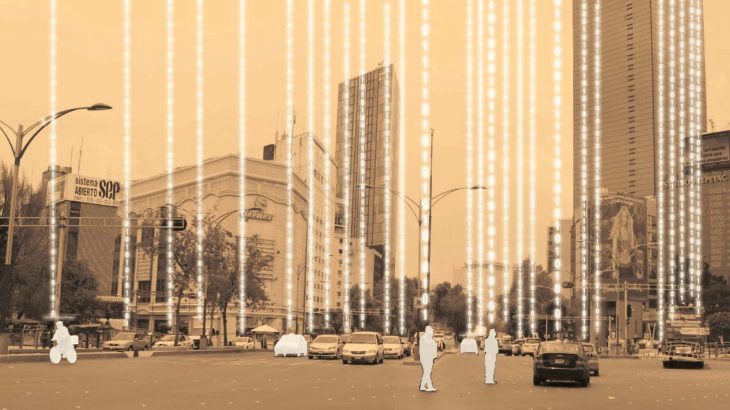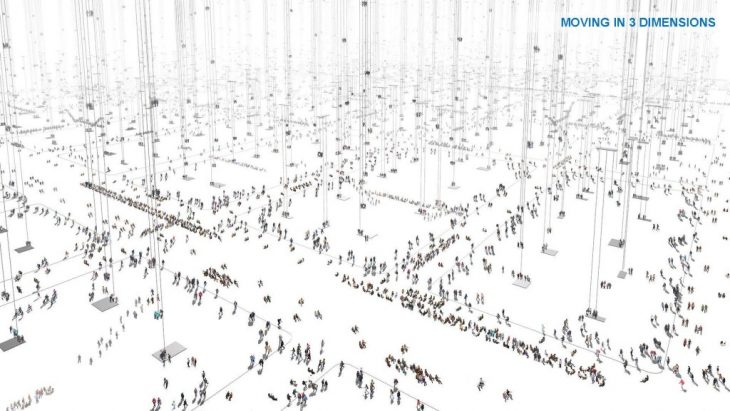Master in City & Technology – Term 3
Studio Name: Internet of People
Total Hours: 40 hours
Senior Faculty: Luis Falcon
Studio Support: Diego Pajarito
During the studio students will investigate the ways in which the role of the citizen can be transformed from a consuming agent in the city into a generating agent by becoming active participants in the utilization & production of data.

from: 911 architecture @Audi Urban Future Initiative
Context & Agenda
Artificial Intelligence is for the Digital Industry what the Assembly Chain was for the Fordist one. The automation of data processing is disrupting the ways industries, companies and people unfold on cities [1]. While private agents are speeding up digital processes focused on improving their product or services, current strategies of the most advanced cities are facing an urban transformation where people’s participation is becoming a key factor. People’s participation is understood here as the capacity of citizens to take part of a decentralized process of decision making [2].
Urban policies on the digital age are primary based on the design of Processes. These processes might evolve all agents in the urban decision making. Furthermore they should be able to adapt rapidly to changes or mistakes on previous decisions. Cities behave as an organism and their development and set of rules should integrate the same level of dynamism that contemporary events push up to them.

from: Studio Schwittala, Berlin @Audi Urban Future Award 2014
Site: Barcelona
The studio will be focused on the city of Barcelona. So the final project (process) to be proposed will take Barcelona as a battlefield.
Three Global Challenges:
The studio is going to face three global challenges as the main topics to be focused on:
The first one is the global growth of the middle class. On February 2017, The Brookings Institution published a report on ‘The unprecedented expansion of the global middle class’. It claimed middle class will represent by 2030 the 60% of the total population, compared to today’s 30%. This means that every year it will grow at an average of 160M people or a yearly 4%. This is directly correlated with the expected global tourism yearly growth: 4% [3]. The society in 2050 will be fully urban, but even further, it will be globally mobile.
The second is what Richard Florida first pushed to cities to attract in: talent [4]. And after he realized that the digital revolution is making IT talent coming into cities (very attractive places to live), rising up was important social urban problems he stepped back[5]: gentrification.
The third challenge is set up by Professor Tony Seba, in his book ‘Clean disruption of energy and transportation’. Where he asserts that solar energy will radically move the oil out of the car industry by 2021. The affirmation is not new. The time has come. The central element is that cities will face a radical change on the disappearing of urban space currently addressed to cars. Even more there will be a huge amount of building spaces currently fit with car parkings which will become empty in a few years.
Methodology 01: benchmarking.
The first step will be to develop a benchmarking of cities. It will be addressed with the three global challenges as phenomenon to be analyzed. There will be three groups of cities to benchmark:
Cities with a high process of sustainable mobility and small size: Amsterdam, Helsinki, Copenhagen, Tallinn or Berlin.
Global cities highly attractive for global talented commuters: Moscow, Paris, New York, San Francisco.
Spanish tourist cities or islands which are becoming urban attraction for IT talent: Benidorm, Mallorca or Tenerife.
Methodology 02. Data Sets.
Along the studio will be addressing hacking or scraping the next data set. The following data sets are the easiest and more accessible to analyse peoples’ urban behavior patterns: Twitter, Airbnb, TripAdvisor (Things to do, Restaurants, Hotels, Vacational Rentals), Bookings (Hotels and Vacational Rentals). These data sets will be downloaded during the first two months of the studio, with different frequency to be set up at the beginning.
The studio will be also provided with two historical data sets on Barcelona from Twitter, Airbnb and TripAdvisor.
Methodology 03. Main objects to study from data sets.
Data sets from Barcelona will help participants to organize and generate indicators to different scale of information volume and quality. The results will be compared with samples from Benchmarking. It might help to validate the degree of biases produced by samples with short time of collection.
From data sets will be analyzed main indicators on mobility, online reputation, social conversations / topics, places of interest, topics of interest, social patterns, time patterns, urban space uses.
Methodology 04. Processes and scenarios.
Final proposal will focused on building scenarios for urban processes to be proposed for urban public consultation. The public consultation will not be carried on in this studio. The goal of the studio is to prepare the material for that consultation on how citizens want to address their own city’s next steps. The processes will be defined as follow:
Scenarios: ‘What if’ approach
Case studies: Current platforms of services which are operating into the city, creating tensions or opportunities, such as Airbnb, Ecooltra, Uber-Cabity, Amazon, Google-Travel etc.
Challenges applied on Barcelona by 2030: 70% of public space empty of cars, 60 Millions of non residents visitors, and a triple current IT immigration process into Barcelona.
[1] Falcón, L. 2018. ‘Cities: networks of trust’. Unpublished.
[2] Bolychevsky, I. 2019. ‘There’s more to decentralisation than blockchains and bitcoin’.
https://medium.com/@shevski/how-decentralised-are-you-a6539eeb27ff
[3] UNWTO. World Tourism Organization.
[4] Florida, R. 2012. ‘The Rise of the creative class’.
[5] Florida, R. 2017. ‘The new urban crisis’.